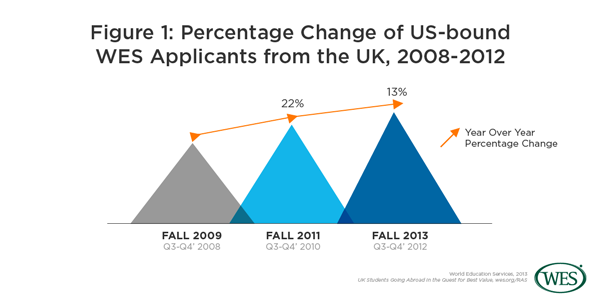Li Chang, Research & Advisory Services, WES
Value for money is one of the central factors influencing consumer choice, and higher education is no exception, especially when the cost of studying for a university degree rises at levels well above the rate of inflation. The global financial crisis has had a significant impact on the UK economy, prompting a raft of belt-tightening initiatives by the government, including changes to higher education funding policies and increases in tuition fees for undergraduate study [1]. The financial crisis has also negatively impacted employment prospects for recent graduates [2]. The net effect is a trend towards larger numbers of British students looking abroad for study opportunities.
At World Education Services (WES), we have seen a surge in education-related applications for credential evaluation from the UK since 2008 (Figure 1). In predicting application volume to U.S. universities, we assess the number of education-related credential evaluation applications from addresses in a particular country in the second half of the year (Q3-Q4) prior to the beginning of the next academic year. [3]
[3]
WES application data show an increase of 22 percent in UK applications from Q3-Q4’2008 (Fall 2009) to Q3-Q4’2010 (Fall 2011). Preliminary numbers from Q3-Q4’2012 (Fall 2013) show a 13 percent increase in applications as compared to the same period in 2010. Combined with anecdotal evidence from other sources [4], these figures suggest that more UK prospects will be applying to U.S. universities and colleges for the 2013-14 academic year.
The growth trend can be attributed to two major factors. Firstly, the cap on tuition fees that British universities can charge grew almost threefold to £9,000 (nearly $15,000) beginning in September 2012. Not surprisingly, this has raised major concerns about affordability, and applications have suffered as a result. In total, UK universities received 255,600 applications from UK 18-year-olds by the January deadline for Fall 2013 programs. This compares with more than 264,500 for the 2010/11 cycle, the year before the introduction of the new fees.
A second factor relates to evidence suggesting that British students are choosing degree programs more selectively based on graduate employment [5] prospects. One in five UK graduates couldn’t find a job [6] at the end of 2011, an unemployment rate similar to that of high school graduates [7]. With the depreciated value of a British college degree and bleak career prospects at home, students are becoming more selective about their study options and increasingly open to studying on full-degree programs abroad.
U.S. higher education institutions interested in recruiting British students can respond to the new demand by communicating the long-term benefits of studying at their institution, in addition to promoting the overall value of the U.S. educational experience.
Previous Issues of Mobility Monitor
- Using Social Media to Recruit in Emerging Markets [8]
- Meet the Explorers – An Emerging International Student Segment [9]
- Is There a New Wave of Indian Undergraduate Students Heading to the U.S.? [10]
- Have the Arab Spring Protest Movements Spurred Youth in the Region to Seek Educational Opportunities Abroad? [11]
